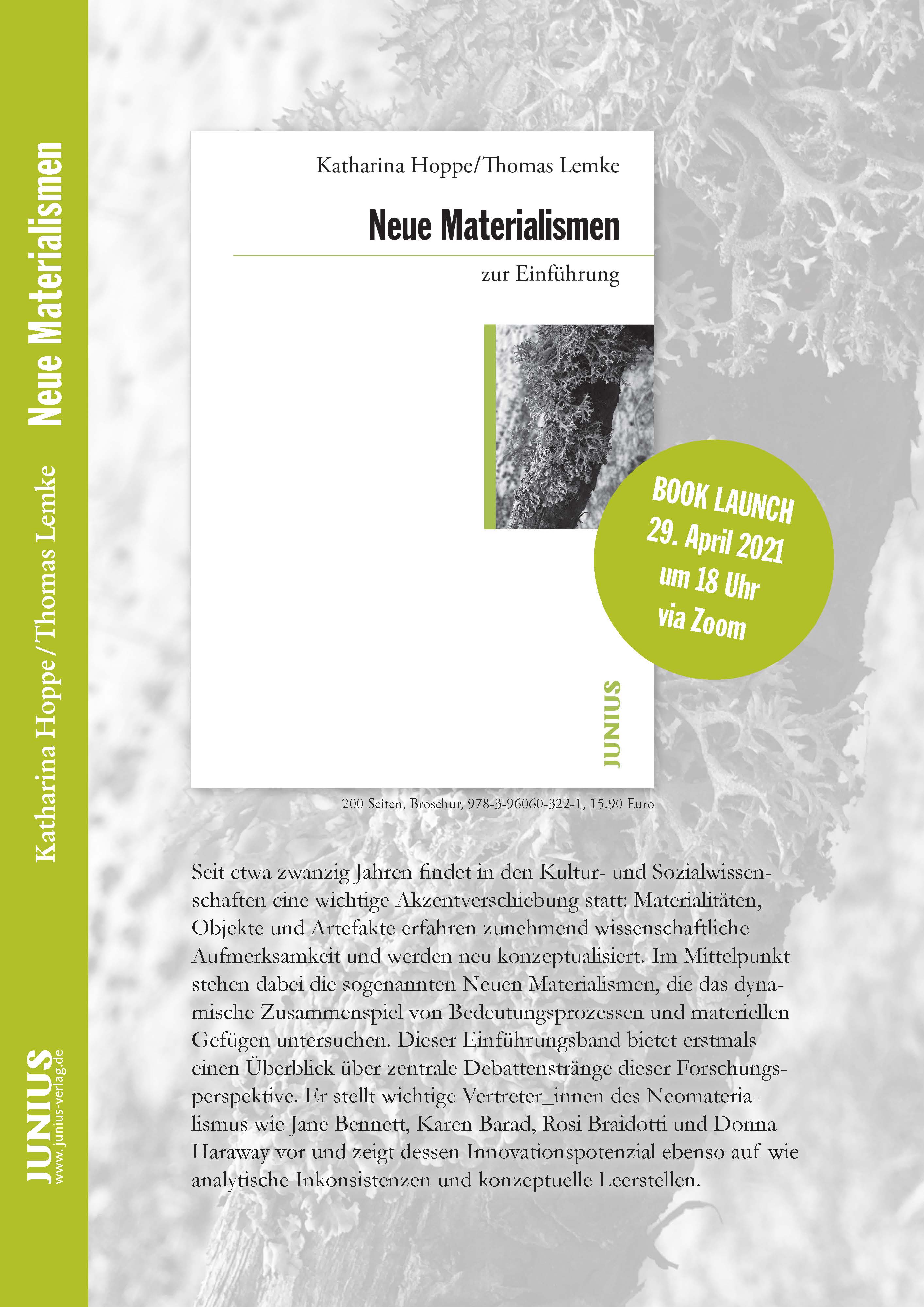2021
Lemke, T. (2021). Welcome to Whenever. Exploring Suspended Life in Cryopreservation Practices. Science, Technology, & Human Values, online first. DOI: 10.1177/01622439211057860.
online first von Thomas Lemke
Lemke, T. (2021). Welcome to Whenever. Exploring Suspended Life in Cryopreservation Practices. Science, Technology, & Human Values, online first. DOI: 10.1177/01622439211057860.
Thomas Lemke: The Government of Things. Foucault and the New Materialisms. New York: NYU Press 2021.
Neuerscheinung von Thomas Lemke
Materialism, a rich philosophical tradition that goes back to antiquity, is currently undergoing a renaissance. In The Government of Things,
Thomas Lemke provides a comprehensive overview and critical assessment
of this “new materialism". In analyzing the work of Graham Harman, Jane
Bennett, and Karen Barad, Lemke articulates what, exactly, new
materialism is and how it has evolved. These insights open up new spaces
for critical thought and political experimentation, overcoming the
limits of anthropocentrism.
Drawing on Michel Foucault's concept
of a “government of things", the book also goes beyond new materialist
scholarship which tends to displace political questions by ethical and
aesthetic concerns. It puts forward a relational and performative
account of materialities that more closely attends to the interplay of
epistemological, ontological, and political issues.
Lemke
provides definitive and much-needed clarity about the fascinating
potential—and limitations—of new materialism as a whole. The Government of Things
revisits Foucault's more-than-human understanding of government to
capture a new constellation of power: “environmentality". As the book
demonstrates, contemporary modes of government seek to control the
social, ecological, and technological conditions of life rather than
directly targeting individuals and populations. The book offers an
essential and much needed tool to critically examine this political
shift.
Thomas Lemke: The Government of Things. Foucault and the New Materialisms. New York: NYU Press 2021.
Book-Launch: Thomas Lemke's „The Government of Things “
am 29.10.2021 von 17 - 19 Uhr (via Livestream)
Thomas Lemkes „The Government of Things. Foucault and the New Materialisms“ ist gerade bei NYU Press erschienen. Die Buchvorstellung erfolgt mit einer Diskussion zwischen Ute Tellmann (Darmstadt), Reiner Keller (Augsburg) und Thomas Lemke am 29. Oktober 2021 von 17–19 Uhr. Die Moderation übernehmen Katharina Hoppe und Frieder Vogelmann.
Die Veranstaltung wird per Livestream übertragen. Wenn Sie teilnehmen möchten, schicken Sie bitte eine Mail an zoeller@soz.uni-frankfurt.de; Ihnen wird dann kurzfristig der Link zugeschickt.
Neues Forschungsprojekt von Josef Barla - Ensuring public health through mobilizing death: Expectations as future-making practices in the bioeconomy of transgenic mosquitoes
Neues Forschungsprojekt von Josef Barla
Von Stechmücken übertragene Krankheiten sind weltweit am Vormarsch. Unter den vielversprechendsten Antworten auf diese Entwicklung finden sich Versuche, neue genetische Strategien zu entwickeln, die die eigene Biologie und reproduktiven Fähigkeiten der Insekten gegen sie selbst wenden und diese damit zu Gesundheitstechnologien transformieren. In Anbetracht der entscheidenden Rolle, die diesen transgenen Organismen als zukunftsweisende Biotechnologien für den Gesundheitsbereich zukommt, ist es erstaunlich, dass es bislang keine Untersuchungen gibt, in denen die Erwartungen, die diesen Projekten zugrundeliegen, als Praktiken eines Zukünfte-Machens beforscht werden. Um diese Forschungslücke zu schließen, zielt dieses Vorhaben über eine ethnographische Feldforschung auf das Erreichen zweier Ziele ab: Zum einen soll die Rolle von Erwartungen als Praktiken eines Zukünfte-Machens in der Bioökonomie transgener Mücken untersucht werden, um zu verstehen, wie nicht nur ‚spekulativer Wert' (Sunder Rajan) generiert wird, sondern auch konkrete Zukünfte in Kraft gesetzt werden. Zum anderen soll verdeutlicht werden, dass diese neuartigen genetischen Strategischen eine Verschiebung in der Molekulargenetik von ‚Bio-Wert' (Waldby), zu etwas, dass ich als ‚Nekro-Wert' bezeichne markieren. Darunter verstehe ich die technowissenschaftliche Mobilisierung und Ökonomisierung des Todes.
Forschungsprojekt gefördert durch die Fritz Thyssen Stiftung für Wissenschaftsförderung (Az. 20.21.0.010SO). Laufzeit 1.10.2021-30.09.2023.
Barla, Josef (2021). Beyond reflexivity and representation: diffraction as a methodological sensitivity in science studies. Distinktion: Journal of Social Theory, DOI: 10.1080/1600910X.2021.1934506.
Neuer Artikel von Josef Barla
|
Against the backdrop of the broad reception of Karen Barad's framework of agential realism, it comes as a surprise that there has been little discussion so far of her core concept of diffraction in the social studies of science. This article aims to evaluate the methodological potentials of a diffractive approach for science studies. In order to achieve this, I will examine Barad's take on quantum mechanics, which serves as the foundation for her ethico-onto-epistemological framework of agential realism. In doing so, I will unpack the crucial role played by diffraction in reworking the relation between the objects of observation and the agencies of observation, and subsequently in reshaping the question of the referent of objectivity. Building on this analysis, I propose the notion of the researcher as transducer, demonstrating how such a take allows for the emergence of an understanding of the researcher as themselves materializing in intra-action with other human and more-than-human forces and practices. As I will show, such a diffractive approach not only shifts our attention even more to the performative power of research as a material practice but also to the constitutive nature of knowledge-making practices, along with their ethical and political implications. |
Barla, Josef (2021). Beyond reflexivity and representation: diffraction as a methodological sensitivity in science studies. Distinktion: Journal of Social Theory, DOI: 10.1080/1600910X.2021.1934506.
Katharina Hoppe / Thomas Lemke: Neue Materialismen zur Einführung, Hamburg: Junius 2021. https://www.junius-verlag.de/Neue-Buecher/Neue-Materialismen-zur-Einfuehrung.html
Neues Buch von Katharina Hoppe und Thomas Lemke
Katharina Hoppe / Thomas Lemke: Neue Materialismen zur Einführung, Hamburg: Junius 2021. https://www.junius-verlag.de/Neue-Buecher/Neue-Materialismen-zur-Einfuehrung.html
 |
Seit etwa zwanzig Jahren findet in den Kultur- und Sozialwissenschaften eine wichtige Akzentverschiebung statt: Materialitäten, Objekte und Artefakte erfahren zunehmend wissenschaftliche Aufmerksamkeit und werden neu konzeptualisiert. Im Mittelpunkt stehen dabei die sogenannten Neuen Materialismen, die das dynamische Zusammenspiel von Bedeutungsprozessen und materiellen Gefügen untersuchen. Dieser Einführungsband bietet erstmals einen Überblick über zentrale Debattenstränge dieser Forschungsperspektive. Er stellt wichtige Vertreter_innen des Neomaterialismus wie Jane Bennett, Karen Barad, Rosi Braidotti und Donna Haraway vor und zeigt dessen Innovationspotenzial ebenso auf wie analytische Inkonsistenzen und konzeptuelle Leerstellen
von Verschuer, Franziska (2021). Making Post/Anthropocentric Futures in Agrobiodiversity Conservation, Nature and Culture, 16(1), 47-64.
Neuer Artikel von Franziska von Verschuer
von Verschuer, Franziska (2021). Making Post/Anthropocentric Futures in Agrobiodiversity Conservation, Nature and Culture, 16(1), 47-64.
Rüppel, Jonas (2021). "Allowing the Data to 'Speak for Themselves'“. Die Klassifikation psychischer Störungen und das Imaginäre der computationalen Psychiatrie. Psychiatrische Praxis 48(S 01):S16-S20.
Neuer Artikel von Jonas Rüppel
Rüppel, Jonas (2021)."Allowing the Data to 'Speak for Themselves'“. Die Klassifikation psychischer Störungen und das Imaginäre der computationalen Psychiatrie. Psychiatrische Praxis 48(S 01):S16-S20.
KONTAKT
Prof. Dr. Thomas Lemke
Goethe-Universität Frankfurt am Main
Fachbereich 03 Gesellschaftswissenschaften
Institut für Soziologie
Schwerpunkt Biotechnologie,
Natur und Gesellschaft
Besucheradresse
Theodor-W.-Adorno-Platz 6
Campus-Westend – PEG-Gebäude
Raum 3.G 027
60323 Frankfurt am Main
Postadresse
Campus Westend
PEG - Hauspostfach 31
60629 Frankfurt am Main
Tel. +49 69 798 36664
lemke@em.uni-frankfurt.de
KONTAKT
Office Management
Angelika Boese
Raum PEG 3.G 030
Tel. +49 69 798 36518
boese@soz.uni-frankfurt.de
- Aktuelles und Presse
- Pressemitteilungen
- Öffentliche Veranstaltungen
- Uni-Publikationen
- Aktuelles Jahrbuch
- UniReport
- Forschung Frankfurt
- Aktuelle Stellenangebote
- Frankfurter Kinder-Uni
- Internationales
- Outgoings
- Erasmus / LLP
- Goethe Welcome Centre (GWC)
- Refugees / Geflüchtete
- Erasmus +
- Sprachenzentrum oder Fremdsprachen
- Goethe Research Academy for Early Career Researchers
- Forschung
- Research Support
- Forschungsprojekte, Kooperationen, Infrastruktur
- Profilbereich Molecular & Translational Medicine
- Profilbereich Structure & Dynamics of Life
- Profilbereich Space, Time & Matter
- Profilbereich Sustainability & Biodiversity
- Profilbereich Orders & Transformations
- Profilbereich Universality & Diversity







